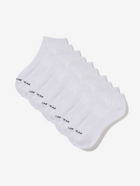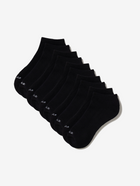In a world where the fashion industry is under increasing scrutiny for its environmental impact, the choice of clothing materials becomes paramount. This article explores the significant environmental challenges posed by the fashion industry, highlighting the role of clothing materials in reducing fashion's carbon footprint.
We'll delve into the resurgence of natural fabrics like cotton, hemp, Tencel, and bamboo, their environmental advantages over synthetic fabrics, and how Allwear's Sustainable fashion collection champions eco-conscious fashion choices.
The Environmental Impact of Fashion
The fashion industry has long been recognized as a major contributor to environmental challenges. From the production of textiles to the disposal of clothing, every step in the fashion lifecycle has significant implications for the planet. Here, we delve into the environmental challenges posed by the fashion industry and the pivotal role of clothing materials in reducing fashion's carbon footprint.
Environmental Challenges in Fashion
Resource Consumption
The fashion industry consumes vast amounts of natural resources. From water-intensive cotton cultivation to energy-hungry textile production, the industry places immense pressure on the planet's resources.
Chemical Pollution
The widespread use of chemicals in dyeing, finishing, and treating fabrics has led to soil and water pollution in many regions. Harmful substances often find their way into ecosystems, affecting not only the environment but also human health.
Textile Waste
The "fast fashion" phenomenon has accelerated the pace at which clothing is discarded. As a result, landfills are overflowing with textiles that take decades or even centuries to decompose. This textile waste contributes to pollution and resource depletion.
The Role of Clothing Materials in Reducing Carbon Footprint
Natural vs. Synthetic Fabrics
The choice of materials in clothing production plays a significant role in determining its environmental impact. Natural fabrics like cotton, hemp, Tencel, and bamboo offer advantages over synthetic materials.
Biodegradability
Natural fabrics are biodegradable, meaning they break down naturally over time. In contrast, synthetic materials like polyester and nylon can persist in landfills for centuries, contributing to long-term environmental issues.
Reduced Energy Consumption
The production of natural fabrics often involves fewer energy-intensive processes compared to synthetic materials. This results in a reduced carbon footprint. Natural fibers like cotton, hemp, and bamboo can be processed with less reliance on fossil fuels and energy-consuming chemical treatments.
The Rise of Natural Fabrics
In recent years, natural fabrics such as cotton, hemp, Tencel, and bamboo have made a remarkable comeback in the fashion industry.
This resurgence is fueled by a collective awareness of the environmental challenges posed by synthetic materials and a growing commitment to sustainability.
The Comeback of Natural Fibers
Organic Cotton: Organic cotton, grown without synthetic pesticides or GMOs, reduces reliance on energy-intensive agricultural practices.
Hemp: Known for its minimal water requirements and versatility, hemp is an eco-friendly choice in various clothing applications.
Tencel: Derived from sustainably sourced wood pulp, Tencel offers a luxurious feel and a lower environmental impact due to its closed-loop production process.
Bamboo: Rapid growth and minimal water requirements make bamboo exceptionally eco-friendly, with natural antibacterial properties enhancing comfort and sustainability.
Environmental Advantages Over Synthetics
Biodegradability: Natural fabrics naturally break down over time, reducing textile waste compared to synthetic materials.
Reduced Water Usage: Natural fabrics require less water during cultivation; for example, organic cotton and hemp conserve water.
Lower Energy Consumption: Natural fabric production involves fewer energy-intensive processes, resulting in a reduced carbon footprint.
Allwear's Sustainable Fashion Collection
At Allwear, we're on a mission to redefine fashion with a commitment to sustainable practices that fight fast fashion. Our collection is a testament to this dedication, combining style, sustainability, and versatility in a way that benefits both consumers and the environment.
At the heart of Allwear's ethos lies a steadfast commitment to eco-conscious fashion. We believe that sustainable choices can lead to a greener and more responsible fashion future.
Eco-Friendly Products and Materials
Organic Cotton Essentials: Our range of organic cotton essentials such as the best selling Allwear Organic Cotton 5'' Sweat Shorts exemplifies responsible farming practices, crafted without synthetic pesticides or GMOs.
Tencel Outerwear: Derived from sustainably sourced wood pulp, our Tencel bomber jacket offer a silky-smooth texture and a closed-loop production process, minimizing environmental impact.
Bamboo Comfort Wear: Experience unmatched comfort and style in our collection, including bra tops, leggings, and compressions shorts Bamboo's rapid growth and minimal water requirements make it exceptionally eco-friendly.
The Benefits for Consumers and the Environment
Creating an Active Lifestyle Capsule Wardrobe
Allwear's collection empowers you to create an active lifestyle capsule wardrobe, allowing you to effortlessly mix and match versatile pieces, simplifying your daily outfit decisions.
Simplifying Wardrobe Decisions
Say goodbye to decision fatigue. With Allwear, your wardrobe is streamlined, making it easier to choose outfits for any occasion, from casual to formal.
Reducing Clothing Waste and Pollution
By investing in durable, eco-friendly clothing, you contribute to reducing clothing waste and the pollution associated with fast fashion, ensuring that high-quality materials result in longer product lifecycles.
Offering Sizing for All and Promoting Inclusivity
Allwear is committed to inclusivity, offering sizing for all body types from XXS to 7XL. We believe that fashion should be accessible and enjoyable for everyone.
Elevating Comfort and Style
Our collection not only focuses on sustainability but also on elevating comfort and style. You can feel good about what you wear, both in terms of aesthetics and the positive impact on the planet.
Final Thoughts
In conclusion, the fashion industry's environmental challenges are undeniable, but by making informed and sustainable fashion choices, we can collectively reduce its impact.
Starting with Allwear's eco-conscious collection, you have the power to embrace natural fibers for a greener fashion future. Choose responsibly, wear confidently, and be a part of the solution.



